|
< Earlier Kibitzing · PAGE 3 OF 4 ·
Later Kibitzing> |
Apr-13-07
 | | Honza Cervenka: <keypusher> You are on right track. Your line can continue with 27.Bc4+ Rf7 28.Bxf7+ Kxf7 29.Rxf4+ Ke7 (29...Ke8 30.Qe6+ Qe7 31.Qg6+ Ke8 32.Qg8+ Kd7 33.Rd4+ etc.) 30.Qxh7+ Ke6 31.Qf7+ Kxe5 32.Qxc7+ Ke6 33.Qxb6+ Ke5 34.Qe3+ Kd6 35.Rd4+  But with inserted 26.Bc4+! white's attack is even more crushing. |
|
Apr-13-07
 | | keypusher: Ah, looks quite convincing. Thanks, Honza! |
|
| Apr-13-07 | | RookFile: Well, this is interesting, apparently, we are in the business of finding moves that both Kasparov and the computer overlooked. Anything's possible, but... |
|
| Apr-13-07 | | Plato: I haven't examined <Honza Cervenka>'s lines yet, but I don't see the point of such criticism. Would it be better if we all sat back lazily and took the word of GMs as gospel truths, rather than trying to think and analyze for ourselves? There have been many such moves (i.e., moves that both Kasparov and the computer overlooked). I don't think there is anything wrong with this "business" -- on the contrary, it is a valuable, noble, and worthwhile effort. Chess is an unthinkably complex game, and even Kasparov armed with a computer can be fallible sometimes. I have great respect not only for Kasparov's OMGP series but also for his open attitude regarding it, e.g. when he invited amateurs to help him improve upon his analysis: <Kasparov: "One of the tasks of this book is to inspire creative discussion. Because undoubtedly there will be many questions asked while reading the book. Today we have the luxury of all amateurs being able to understand the complexity of the game, by analysing with the computer. It is no longer a secret that belongs to top players and some experts. Everyone can search for chess truth and ask questions."> Kasparov is pleased that people are improving upon his analysis. He has never said (nor would he say) that all of his analysis is error-free. Those who take up his challenge and draw their own conclusions are deserving of our respect, nothing less. |
|
| Apr-13-07 | | acirce: Exactly, <Plato> - remember Sorokhtin? http://www.chessbase.com/newsdetail...
http://www.chessbase.com/newsdetail... |
|
| Apr-13-07 | | RookFile: Yes, yes. Kasparov and the computer could have made a mistake. It's possible. It's just not likely. |
|
| Apr-13-07 | | ughaibu: On the other hand, it's unlikely that Honza has made a mistake, in my experience. |
|
| Apr-13-07 | | Hesam7: After 20.Qh3 Nf6 21.Bc3 f4 22.Qh4 Bb7 23.Re6 Qd5 24.Rf2 Rxa2 25.Rxe5 Ra1+ 26.Bf1 Qd6 27.Ne6 it seems that White is winning: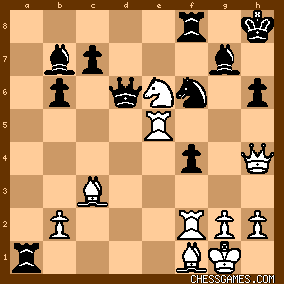
click for larger view27...f3 28.Nxf8 fxg2 29.Rxg2 Bxg2 30.Ng6 Kh7 31.Kxg2 Qc6 32.Kf2 Ra4 33.Nf4 Ne4 34.Kg1 Nxc3 35.Bd3 Ne4 36.Rxe4 Rxe4 37.Ng2 Qc1 38.Qe1 Qxe1 39.Nxe1 Bxb2 40.Bxe4 Kg7 41.Kf2 Bd4 42.Ke2 b5 43.Nd3 (eval: +1.19 @ depth 15 by Toga II) |
|
| Apr-13-07 | | Hesam7: After 20.Qh3 Nf6 21.Bc3 f4 22.Qh4 Bb7 23.Re6 Kg8 24.Rxe5 Bd5 25.Rxf4 White looks winning: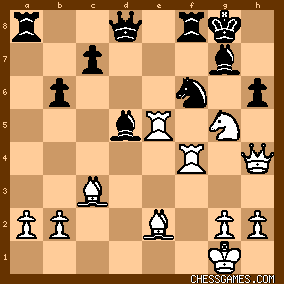
click for larger view25...Rxa2 26.h3 Qd6 27.Qg3 Kh8 28.Rxd5 Qxd5 29.Ne4 Qd8 30.Qg6 Qe8 31.Rxf6 Qxg6 32.Rxg6 Bxc3 33.Nxc3 Rxb2 34.Rxh6 Kg7 35.Re6 c5 36.h4 Rd8 (eval: +1.38 @ depth 15 by Toga II) |
|
Apr-13-07
 | | keypusher: Here is a funny variation: 20. Qh3 Nf6 21. Bc3 f4 22. Qh4 Bb7 23. Re6 Kg8 24. Rxe5 Nh7? (yes, it's just as bad a move later) 25. Bc4+ Kh8 26. Qxh6 Bxh6 27. Re7+ Nf6 28. Rh7#. 23...Bd5 24. Rxe5 (maybe 24. Rd1 is stronger) Ne4? 25. Rxd5 Qxd5 26. Qxh6+ doesn't help. So can nothing be done for Black? |
|
| Apr-13-07 | | Hesam7: This maybe an improvement for Black: 20.Qh3 Nf6 21.Bc3 f4 22.Qh4 Bb7 23.Re6 Qd5 24.Rf2 Rxa2 25.Rxe5 Ra1+ 26.Bf1 <Qd3!>: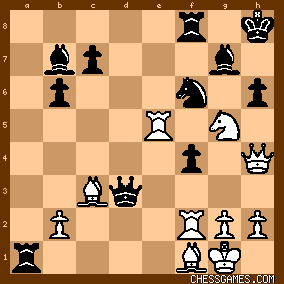
click for larger view27.Rxf4 Qg6 28.g3 Ba6 29.Ne6 Rf7 30.Re1 Rxe1 31.Bxe1 Bxf1 32.Rxf1 Nh5 33.Rxf7 Qxf7 34.Nxg7 Kxg7 35.Bd2 c5 36.b4 Qd5 37.Qe7 Kg6 38.Qe8 Kh7 39.bxc5 Qxc5 40.Be3 (eval: +0.65 @ depth 17 by Toga II) |
|
| Apr-13-07 | | Atking: I'm not working with a computer so my suggestion could be stupid but after 23.Re6 isn't 23. ...Ng4 playable ? On 24.Rg6 there is 24. ...Rf5. |
|
Apr-14-07
 | | Honza Cervenka: Maybe 22...Qe8 instead of 22...Bb7 can be an improvement for black. What does Rybka/Toga/Fritz10 & co think about it? |
|
Apr-14-07
 | | Honza Cervenka: <Atking: I'm not working with a computer so my suggestion could be stupid but after 23.Re6 isn't 23. ...Ng4 playable ? On 24.Rg6 there is 24. ...Rf5.> 25.Rxg7 seems to be a problem here. 25...Kxg7 26.Ne6+ wins a Queen and after 25...Rxg5 26.Rxg5 Qxg5 27.Qxg5 hxg5 28.Bxg4 white is a piece up. |
|
Apr-14-07
 | | Honza Cervenka: After 20.Qh3 Nf6 21.Bc3 f4 22.Qh4 Qe8!? white probably cannot play 23.Rxc7 for 23...Nd5. So 23.Bf3 or 23.Bb5 seem to be main candidates from white's side. I still think that 23.Bf3 Rxa2 24.Re1 gives white enough to keep balance but the question is whether he can get more than that. The position is very complex. |
|
| Apr-14-07 | | artemis: rookfile: the point of analysis for amateurs is not to find something that the big boys missed, but it is to confront the position yourself. Certainly Kasparov working with machine's will produce fearsome analysis, but that doesn't mean that you can't learn something from the analysis on your own. |
|
| Apr-14-07 | | Hesam7: <<Honza Cervenka>: After 20.Qh3 Nf6 21.Bc3 f4 22.Qh4 Qe8!? white probably cannot play 23.Rxc7 for 23...Nd5.> After: 20.Qh3 Nf6 21.Bc3 f4 22.Qh4 Qe8 23.Rxc7 Nd5 24.Bh5! Black is forced to give up his Queen, any Queen move will lose to Rxg7. So the game continues: 24...hxg5 25.Qxg5 Nxc7 26.Bxe8. Now it looks like Black will lose even more material: 26...Nxe8 [26...Rxe8? 27.Rxf4] 27.Bxe5 Rxa2 28.Rxf4 Ra1+ 29.Kf2 Rxf4+ 30.Qxf4 Bd7 31.Qh6+ Kg8 32.Bxg7 Nxg7 33.Qxb6: 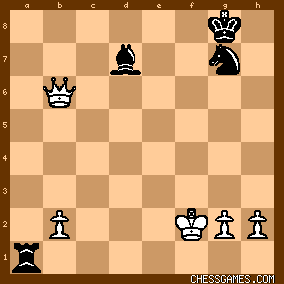
click for larger viewWhite should win this. |
|
| Apr-14-07 | | Hesam7: I think this shows that after 20.Qh3 is 20...Rf6. After: 21.Bc4 f4 22.Rxf6 Bxh3 23.Nf7+ Kh7 24.Nxd8 Bxf6 25.Nc6 Be6 26.Re1 Bg8 27.Nxe5 Ne3 28.Bd3 Kg7: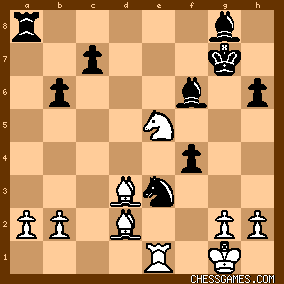
click for larger viewBlack looks OK, if not better. What does Kasparov say on this?? |
|
Apr-14-07
 | | keypusher: <Hesam 7>
20...Rf6 21. Bc4! f4! 22. Qf3! (Taimanov judged 22. Rxf6?! Bxh3 23. Nf7+ Kh7 24. Nxd8 to be in his favour, but 24...Nxf6 25. Nc6 Ne4 26. Bd3 Bf5 27. Bc3 Re8 or 27...Nd6 gives Black at least an equal game, while after 24...Bxf6! 25. Nc6 Be6 26. Re1 b5 27. Bb3 Ra6! 28. Nxe5 Ne3! 29. Bxe6 Bxe5 30. Bb3 c5 he even has winning chances) 22...Bb7! 23. Rxf6 (23. Ne6? Qd7!) 23...Nxf6 24. Nf7+ Kh7 (Taimanov) 25. Bd3+! (not 25. Qxb7? Qd4+) 25...Kg8 26. Qxb7 Qd4+! 27. Rf2! Ng4 28. Qxa8+ Kxf7 29. Qc6 (after 29. Qc8 Qxf2+ 30. Kh1 Qd4 31. Qxc7+ Kf6 32. Qc6+ Ke7 White has only perpetual check) 29...Qxd3 30. Qxc7+ Kg6 31. Qxb6+ Kf5, regaining the material and easily maintaining the balance <OMGP IV, p. 387.> All "!" and "?" as in the original. You and Honza should definitely submit this analysis to chessbase when you are done. |
|
| Apr-14-07 | | Hesam7: Also worth noting is the following line in which White forces the draw: 21.Rxh6+ Bxh6 22.Bxh6 Nf4 23.Bc4 Bxf3 24.Qxf3 Qd4+ 25.Kh1 Qxc4 26.Bxf4 exf4 27.Qh5+. <<keypusher>: <Hesam 7>20...Rf6 21. Bc4! f4! 22. Qf3! (Taimanov judged 22. Rxf6?! Bxh3 23. Nf7+ Kh7 24. Nxd8 to be in his favour, but 24...Nxf6 25. Nc6 Ne4 26. Bd3 Bf5 27. Bc3 Re8 or 27...Nd6 gives Black at least an equal game, while after 24...Bxf6! 25. Nc6 Be6 26. Re1 b5 27. Bb3 Ra6! 28. Nxe5 Ne3! 29. Bxe6 Bxe5 30. Bb3 c5 he even has winning chances) 22...Bb7! 23. Rxf6 (23. Ne6? Qd7!) 23...Nxf6 24. Nf7+ Kh7 (Taimanov) 25. Bd3+! (not 25. Qxb7? Qd4+) 25...Kg8 26. Qxb7 Qd4+! 27. Rf2! Ng4 28. Qxa8+ Kxf7 29. Qc6 (after 29. Qc8 Qxf2+ 30. Kh1 Qd4 31. Qxc7+ Kf6 32. Qc6+ Ke7 White has only perpetual check) 29...Qxd3 30. Qxc7+ Kg6 31. Qxb6+ Kf5, regaining the material and easily maintaining the balance <OMGP IV, p. 387.> All "!" and "?" as in the original. You and Honza should definitely submit this analysis to chessbase when you are done.> Thanks. What do you mean by submitting analysis to chessbase?? |
|
Apr-14-07
 | | keypusher: <What do you mean by submitting analysis to chessbase??> Chessbase used to have a special website for people to submit analytical corrections and questions to OMGP. See the links in acirce's post. I don't think they do any more, in which case my suggestion was just a mistake. Sending analysis to chessbase might be a good way to publicize it anyway, though. |
|
| Apr-14-07 | | Hesam7: OK lets look at 20.Qh3 Rf6 21.Bc4! f4! 22.Qf3!

click for larger viewHere Glaurung 1.2.1 gives the following:
22...hxg5 23.Rxf6 Bg4 24.Rh6 Bxh6 25.Qxg4 Nf6 26.Qe6 Qd6 27.Bc3 Qxe6 28.Bxe6 Re8 29.Bf7 Re7 30.Bg6 Nd5 31.Rf3 Nxc3 32.Rxc3 (eval: -0.34 @ depth 19) <keypusher> do you know where Taimanov's original analysis was published?? |
|
Apr-14-07
 | | keypusher: Taimanov wrote a book about the match, <Ya byl zhertvoy Fishera>, which was published in St. Petersburg in 1993. I have never seen it, but many of its analyses are reprinted in <OMGP IV> and in <Russians versus Fischer>. |
|
| Apr-15-07 | | Hesam7: It looks that Taimanov's analysis is faulty. Now beside the one I posted before if we go deeper in his line: 20.Qh3 Rf6 21.Bc4 f4 22.Qf3 Bb7 23.Rxf6 Nxf6 24.Nf7+ Kh7 25.Bd3+ Kg8 26.Qxb7 Qd4+ 27.Rf2 Rxa2 (instead of 27...Ng4 suggested by Taimanov) 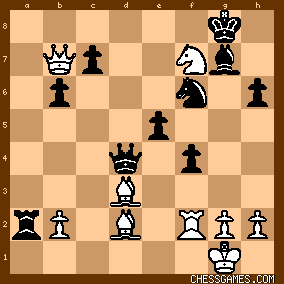
click for larger viewHere it seems White has nothing better than a prepetual: 28.Nxe5 Ra1 29.Bf1 Ne4 30.Qc8 Kh7 31.Qf5 Kg8. All in all it seems that best and sufficient defense to 20.Qh3 is 20...Rf6! not 20...Nf6? |
|
Apr-16-07
 | | Honza Cervenka: <Hesam7> <After: 20.Qh3 Nf6 21.Bc3 f4 22.Qh4 Qe8 23.Rxc7 Nd5 24.Bh5!> Nice find. 24.Bh5 did not cross my mind. |
|
 |
 |
|
< Earlier Kibitzing · PAGE 3 OF 4 ·
Later Kibitzing> |





